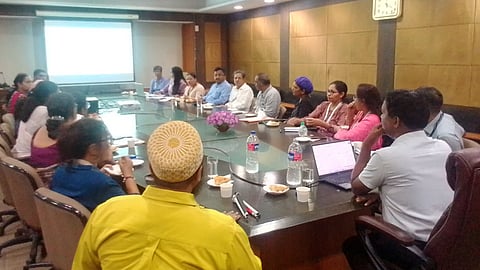

Goa State Commission for Protection of Child Rights (GSCPCR) has decided to streamline and strengthen inclusive education.
To take forward this endeavour, the commission invited several State agencies for deliberation on April 4, 2023, at the Conference Hall, Secretariat, Porvorim.
The agencies included the Directorate of Education, District Early Intervention Centres (North Goa and South Goa), Institute for Psychiatry and Human Behaviour, Goa Medical College, State Family Welfare Bureau, Directorate of Social Welfare, Office of the State Commissioner for Disabilities and Sangath.
At the meeting, Peter F Borges, Chairperson GSCPCR, called for significant investment, proactive and innovative thinking and a policy framework that will endure across government.
According to GSCPCR, students with disabilities deserve the same access to a local school as all their peers. Full inclusion is possible with the right funding and creating an enabling environment, it stated.
According to GSCPCR, students with disabilities deserve the same access to a local school as all their peers. Full inclusion is possible with the right funding and creating an enabling environment, it stated.
The meeting came out with several recommendations that the Commission would recommend to the government for strengthening inclusive education.
The GSCPCR called upon the Directorate of Education to initiate Educational Monitoring Information System for children with disabilities which will capture geographical location, types of disabilities, educational needs, proximity to facilities and other indicators to enable and plan for inclusion.
This, the GSCPCR recommended, should include non-aided and private schools too. This will help identify barriers, plan for more facilities and avoid such instances where the children with disabilities face mental trauma of being made to wait or denied admission due to improper planning and facilities allocation by the state, it stated.
The Commission called for early intervention, which, it stated, was the best way to support the development and well-being of children with disability, autism or other additional needs, including developmental delay.
The Commission called for early intervention, which, it stated, was the best way to support the development and well-being of children with disability, autism or other additional needs, including developmental delay.
It can help children develop the skills they need to take part in everyday activities. Sometimes children who get early intervention need less or no support as they get older, it observed.
It urged the Directorate of Education to ensure concentrated early intervention drive in collaboration through Rashtriya Bal Swasthya Karyakram (RBSK) to detect children in collaboration with, DEICs, PHCs, ICDS, ECCE centres and other school readiness programmes.
The Commission also recommends to the DoE to conduct access audit and ensure barrier-free environments, accessible buildings, classrooms, drinking water, toilets, playgrounds, laboratories, libraries, accessibility in terms of ramps with railings, colour contrast of blackboards for visual impaired, enhancing acoustics through classroom designing and use of appropriate materials.
It also recommended capacity-building programmes to ensure continued development of skills and confidence of teachers and support staff in meeting the diverse range of children’s needs, as trained and motivated system is at the heart of effective inclusion, translating policy into practice.
The Commission has asked the DoE to issue a circular to schools to initiate disability certification at DEICs in elementary section at the age of 8 onwards for learning disabilities and slow learners and for intellectual disability before the age of 5.
The Commission has asked the DoE to issue a circular to schools to initiate disability certification at DEICs in elementary section at the age of 8 onwards for learning disabilities and slow learners and for intellectual disability before the age of 5.
Further, it recommended that DoE should change the time of submission of certificates in 10th standard from the current 9th standard to 8th standard.
It should be communicated to schools that certification should not be seen for educational benefits and exemption, but to improve development through integrating family support, health, and nutrition services.
It also called for a circular for enforcing non-negotiable principles by pronouncing a separate code of conduct towards not providing admission to children with disabilities, including children with sensory disabilities viz hearing impairment, visual impairment and deaf-blind, in regular school (aided and unaided) through penalization.
The Commission also recommended enhancement of human resources, i.e special educators, home-based educators; infrastructure, especially resource rooms, i.e. increase of life skill resource rooms and effect change in ratio (from 1:8 to 1:4) for life skill resource room and (from 1: 20 to 1:15) for academic resource rooms.
The Commission recommended to the Directorate of Health Services to establish more DEIC satellite centres at selected PHCs which can reduce the burden at district centres for better managerial and monitoring systems.